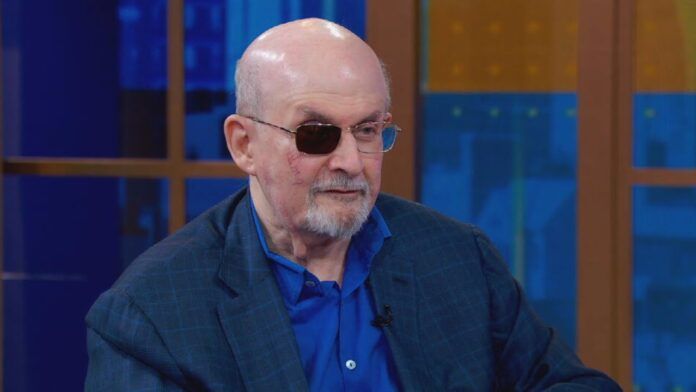In a poignant recount, Sir Salman Rushdie opens up about the emotional and physical scars from the 2022 stabbing and his ongoing recovery
Sir Salman Rushdie, the renowned Booker Prize-winning author, recently shared a vivid and unsettling account of the stabbing attack he suffered in 2022, which resulted in severe injuries, including the loss of an eye. Speaking to the BBC, Rushdie described the terrifying experience and its enduring impact on his daily life.
The attack occurred while Rushdie was preparing to deliver a lecture at an educational institute in New York. The assailant, identified as 26-year-old Hadi Matar of New Jersey, allegedly sprinted up the stage and inflicted multiple stab wounds on Rushdie, targeting his neck and abdomen. The assault, which lasted a mere 27 seconds, left Rushdie in a critical condition, surrounded by a “spectacular quantity of blood.”
Recalling the immediate aftermath, Rushdie expressed a haunting recollection of his injuries. “My eye was like a soft-boiled egg, hanging off my face. Losing it upsets me every day,” he shared. The physical limitations he faces, such as difficulties in navigating stairs and crossing streets, are a constant reminder of the attack’s brutality.
Despite the physical and psychological trauma, Rushdie remains defiant and has channelled his experiences into his latest book, “Knife.” The novel not only explores the themes of violence and recovery but also serves as a metaphorical act of resistance against the forces that sought to silence him.
Throughout his career, Rushdie has been a staunch advocate for freedom of expression, a stance that has not wavered even in the face of extreme adversity. He lamented the current societal trends where the very notion of free speech is increasingly contested, especially among the youth. “The point of freedom of speech is to permit speech you don’t agree with,” Rushdie insisted, highlighting the importance of protecting this fundamental right.
The legal proceedings against Matar have been fraught with delays, partly due to debates over the potential use of Rushdie’s book as evidence in the trial. Matar, who has pleaded not guilty, remains in custody without bail. The trial is expected to commence in the autumn, where Rushdie might come face-to-face with his alleged attacker for the first time.
Sir Salman’s ordeal has drawn global attention to the dangers faced by individuals standing up for freedom of expression. The solidarity expressed by supporters worldwide underscores the ongoing struggle against extremism and the defence of intellectual freedom.
In the face of such challenges, Rushdie’s resolve is clear. He plans to continue engaging with the public, albeit with heightened security measures. “I don’t want a restricted or confined life,” he affirmed, signalling his determination to not let the attack define his future.
